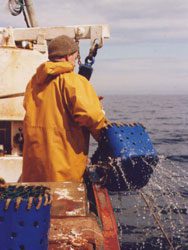25 February 2011
There is a paradox in the way that the present Government is using heavy duty, top-down legislation, inherited from the previous administration to establish a network of marine protected areas in UK waters.
In many ways this approach is the opposite of the Big Society. Despite an expensive and elaborate process of “stakeholder participation” through four regional projects, the approach, designed by the previous government but implemented under the Coalition:
- Is an example of statism – the belief that society’s goals can best be achieved through centralised government controls
- Is superficially democratic and participative but for those involved, feels like a juggernaut speeding to a fixed destination
- Is impatient – it is on a fixed timetable at least in part to meet broader EU controls in the form of the Marine Strategy Framework Directive although the most immediate time constraints are self-imposed
- Is formulaic – despite different regional approaches, conformity is achieved through “Ecological Network Guidance” to ensure ecological (but not social or economic coherence) and there is a big-government back-stop if the regional projects fail to deliver
- Suffers from an incoherence at the heart of the project – we don’t know with any degree of precision what it is we are protecting, or how much of it to protect
- Is careless of the consequences for “small people” – the process has hardly begun to consider the consequences of displacement for fishermen, their communities or the knock-on effects in adjacent or distant fisheries
Even in the fishing industry, where the displacement effects of this approach are likely to be felt more acutely than any other offshore sector, it is acknowledged that there is a need to protect biodiversity and vulnerable species and habitats and that marine conservation zones have a role to play in achieving this. It is the way that the previous government and now the present government have gone about it that has given rise to concerns which have found their expression in the MPA Fishing Coalition.
What could a Big Society approach look like?
There appears to be no fixed ideas about what the Big Society looks like but it seems to centre on a move away from a top-down legislative approach to multiple initiatives at a local level with a high degree of involvement and control resting with citizens.
We are already well down the top-down road with MCZs but it is worth considering what an alternative approach might look like. It would be:
- Incremental. In other words, the process would start with a handful of experimental MCZs which would be trialled and tested before moving on to develop additional sites. At the very least this would avoid a car crash that such mega-projects are prone to.
- Adaptive. Lessons would be learned through these early MCZs and the problems encountered avoided subsequently as the number of sites is expanded
- Evidence based. The rushed process that we are witnessing relies on the formula that decisions are based on the best available information and science. But the quality of “best available” can be very low indeed. An adaptive approach offers the opportunity to build the evidence base to a level where there is a reasonable confidence in it and therefore that management measures within MCZs will have the desired effect.
- Participative. The current process has more in common with the ideology of nature reserves from the 1890s. One of the important lessons learned from these early experiments in nature conservation is that they will fail to provide the protection that they aim for if they ignore the needs of the local populations. Similar considerations apply to marine conservation zones, despite advances in monitoring and control technology.
- Win-win. MCZs established through a genuine process of engagement with the fishing communities could identify ways in which the design of the MCZ could be adapted to deliver advantages for both fishers and the environment. Trust is at the core of this approach: but there are few in the fishing industry who believes that the current process offers them anything other than harm. Those that are involved in the four regional projects (including the NFFO and many NFFO members) do so for reasons of self-defence).
- Transitional Support The hard part in the introduction of any new management regime is often the short-term impact – which of course can carry long term consequences. A more thoughtful approach would have woven into its fabric ways of easing the transition
Unease amongst Environmentalists
There are signs of mounting unease, even amongst the more thoughtful and less gung-ho environmentalists, about the monster that their enthusiasm has helped to create. The rushed process, the failure to give anything but superficial consideration to the issue of displacement and above all the nagging question whether marine protected areas are the best way to deliver Good Environmental Status as required under the EU Marine Strategy Framework Directive are all causing unease. A handful of pristine jewels surrounded by a degraded seascape – caused by the displacement of economic activities – does not seem like a huge step forward.
Even the civil servants charged with implementing the policy of the previous administration seem to appreciate that a wrong turning has been taken. Fear of loss of face seems the only motivating force driving the project forward, now that the money is about to run out and Natural England’s role has been redefined.
Contradictions
There is no sign however that policies will change any time soon; so we are left with a series of contradictions: a government committed to the Big Society implementing a Big Government approach; an environmental lobby anxious about the speed and perhaps even the direction of travel; and a fishing industry involved in the process but braced for the impact.

